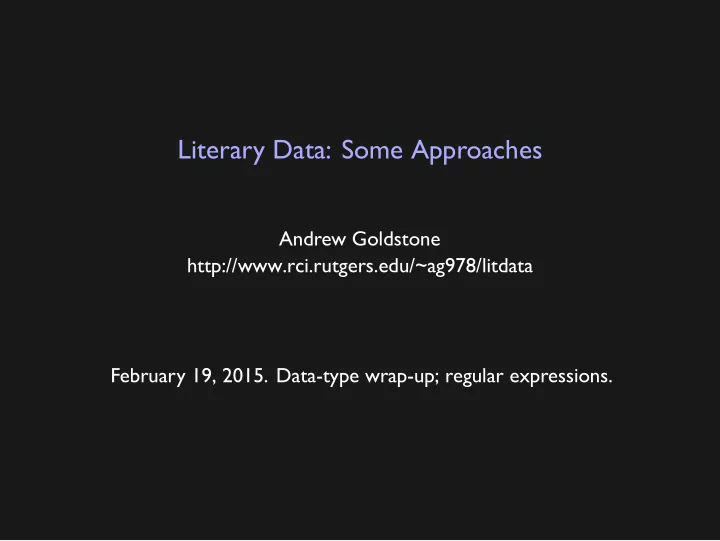

Literary Data: Some Approaches Andrew Goldstone http://www.rci.rutgers.edu/~ag978/litdata February 19, 2015. Data-type wrap-up; regular expressions.
laureate_genre <- factor(c("novel", "short story", "novel", "poetry", "novel")) laureate_genre [1] novel short story novel poetry [5] novel Levels: novel poetry short story factors ▶ levels(laureate_genre) for the levels
lists
clues <- list( absent=c("Assyrian", "Sensible Course"), present=list( unnecessary=c("Duchess", "Race"), necessary=list( invisible=c("Scandal", "Twisted"), visible=list( undecodable=c("Boscombe", "Five"), decodable=c("Red-Headed", "Identity") ) ) ) ) hierarchy
clues $absent [1] "Assyrian" "Sensible Course" $present $present$unnecessary [1] "Duchess" "Race" $present$necessary $present$necessary$invisible [1] "Scandal" "Twisted" $present$necessary$visible $present$necessary$visible$undecodable [1] "Boscombe" "Five" $present$necessary$visible$decodable [1] "Red-Headed" "Identity"
clues$present$unnecessary [1] "Duchess" "Race" clues$present$necessary$visible$decodable [1] "Red-Headed" "Identity"
Peru 3 Mario Vargas Llosa 2010 5 Sweden Tranströmer 2011 Tomas 4 China Yan 2012 Mo Canada laureates[1:5, c("firstname", "surname", "year", Munro 2013 Alice 2 France Modiano 2014 Patrick 1 surname year bornCountry firstname "bornCountry")] data frames
frm[rows, cols] frame indexing ▶ blank : keep them all ▶ number: choose that row/column ▶ numeric vector: choose those rows/columns ▶ logical: filter those rows/columns ▶ character vector: choose these named rows/columns (but rows don’t have names by default)
frm$colname == frm[, "colname"] shorthand frm$colname[rows] == frm[rows, "colname"]
homework questions? Wingham Arequipa 5 Vargas Llosa Tranströmer Stockholm 4 Gaomi Yan 3 Munro recent_flags <- laureates$year >= 2010 2 Paris Modiano 1 bornCity surname laureates[recent_flags, c("surname", "bornCity")] query logic
Munro recent_flags <- laureates$year >= 2010 Tranströmer Stockholm 4 Gaomi Yan 3 Wingham 2 Arequipa Paris Modiano 1 bornCity surname laureates[recent_flags, c("surname", "bornCity")] 5 Vargas Llosa query logic ▶ homework questions?
laureates[order(laureates$surname, laureates$firstname)[1:5], c("surname", "year")] surname year 49 Agnon 1966 38 Aleixandre 1977 54 Andric 1961 48 Asturias 1967 46 Beckett 1969 ordering
Which of laureates$bornCountry contain "now" ? grep(pattern, s) # which elements match pattern? string search
grep(pattern, s) # which elements match pattern? string search ▶ Which of laureates$bornCountry contain "now" ?
grep("now", laureates$bornCountry) laureates$bornCountry[grep("now", laureates$bornCountry)]
[19] "Schleswig (now Germany)" [10] "Bosnia (now Bosnia and Herzegovina)" [18] "Tuscany (now Italy)" [17] "British India (now India)" [16] "East Friesland (now Germany)" [15] "Prussia (now Germany)" [14] "Prussia (now Germany)" [13] "Russian Empire (now Poland)" [12] "Russian Empire (now Finland)" [11] "French Algeria (now Algeria)" [9] "Ottoman Empire (now Turkey)" grep("now", laureates$bornCountry, value=T) [8] "Austria-Hungary (now Ukraine)" [7] "Russian Empire (now Poland)" [6] "Crete (now Greece)" [5] "Russian Empire (now Lithuania)" [4] "Austria-Hungary (now Czech Republic)" [3] "USSR (now Russia)" [2] "Free City of Danzig (now Poland)" [1] "Persia (now Iran)" or, for short
gsub("male", "male-identified", laureates$gender) gsub(pattern, replacement, s) # globally replace string substitution
grep("197.", laureates$year, value=T) [1] "1979" "1978" "1977" "1976" "1975" "1974" "1973" [8] "1972" "1971" "1970" a new grammar: patterns ▶ most characters match themselves ▶ . matches any character
meta: backslash \\ next normal character is special \\d a digit \\s a white-space character (space, tab….) \\w a “word character” (letters…) \\D anything but a digit \\S anything but white space \\W anything but a word character
[ Edited 2/21/15 : This used to show perl=T but that was misleading. That op- tion can work around some encoding issues but there are other approaches to encoding problems that are more comprehensive, and which I’ve used to fix this slide. See Gries for examples of the kind of patterns that require perl=T .] grep("\\W", laureates$surname, value=T) [1] "Vargas Llosa" "Le Clézio" "García Márquez" [4] "Martin du Gard" "O'Neill" "von Heidenstam"
grep("\\W", laureates$surname, value=T) [1] "Vargas Llosa" "Le Clézio" "García Márquez" [4] "Martin du Gard" "O'Neill" "von Heidenstam" [ Edited 2/21/15 : This used to show perl=T but that was misleading. That op- tion can work around some encoding issues but there are other approaches to encoding problems that are more comprehensive, and which I’ve used to fix this slide. See Gries for examples of the kind of patterns that require perl=T .]
grep("^Hungary", laureates$bornCountry, value=T) grep("Hungary", laureates$bornCountry, value=T) zero-width ˆ the start of the string $ the end of the string \\b a word boundary
grep("^Hungary", laureates$bornCountry, value=T) grep("Hungary", laureates$bornCountry, value=T) zero-width ˆ the start of the string $ the end of the string \\b a word boundary
make-your-own classes ▶ [...] matches exactly one, except ▶ a-z means the range (code order) ▶ initial ˆ means opposite day
quantifiers ? one or none of previous * zero or more + one or more {n} exactly n {n,m} from n to m (can omit either)
spacey <- c("Doris Lessing", "Doris Lessing", "Doris Lessing") grep("Doris Lessing", spacey) [1] 1 ▶ How to match all three?
grep("Doris\\s+Lessing", spacey) [1] 1 2 3
grep("^M.*o", laureates$surname, value=T) [1] "Modiano" "Munro" "Morrison" "Mahfouz" [5] "Milosz" "Montale" "Mommsen" grep("^M.*o$", laureates$surname, value=T) [1] "Modiano" "Munro" anchors
meta: backslash (2) \\ next special character is normal \\. \\* a literal period, a literal asterisk \\+ \\? literal + and ? \\( \\[ \\{ literal, literal, literal \\\\ literal backslash
time to get grammatical (...) q quantifier q applies to everything in (...) (...|...) one or the other of the sides of the |
grep("^(\\w+ ){2,}", laureates$firstname, value=T) [1] "Sir Vidiadhar Surajprasad" [2] "Sir Winston Leonard Spencer" [3] "André Paul Guillaume" [4] "Carl Friedrich Georg" [5] "Carl Gustaf Verner" [6] "Gerhart Johann Robert" [7] "Count Maurice (Mooris) Polidore Marie Bernhard" [8] "Paul Johann Ludwig" [9] "Selma Ottilia Lovisa" [10] "Christian Matthias Theodor"
many_names <- laureates$firstname[c(7, 99)] many_names [1] "Jean-Marie Gustave" "Selma Ottilia Lovisa" gsub("(\\w+) .*$", "\\1", many_names) [1] "Jean-Marie" "Selma" pattern substitution ▶ in substitution string, \\n corresponds to n th parenthesized expression in pattern
gsub("^som(eth)ing$", "\\1", tricky_years) tricky_years <- c("1774.", "[1793]", "[1795?]", "1792-96.") cleanup
gsub("^\\D*(\\d{4}).*$", "\\1", tricky_years) [1] "1774" "1793" "1795" "1792"
next ▶ Hockey, McCarty, McPherson, Kirschenbaum ▶ http://www.rci.rutgers.edu/~ag978/litdata/hw5 ▶ read Gries according to the guide in homework 5 ▶ groups…
Recommend
More recommend